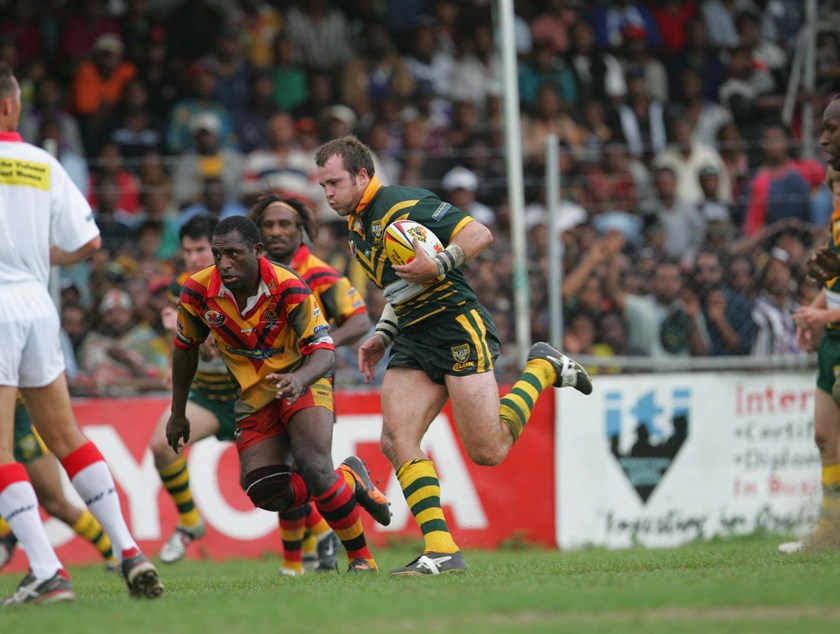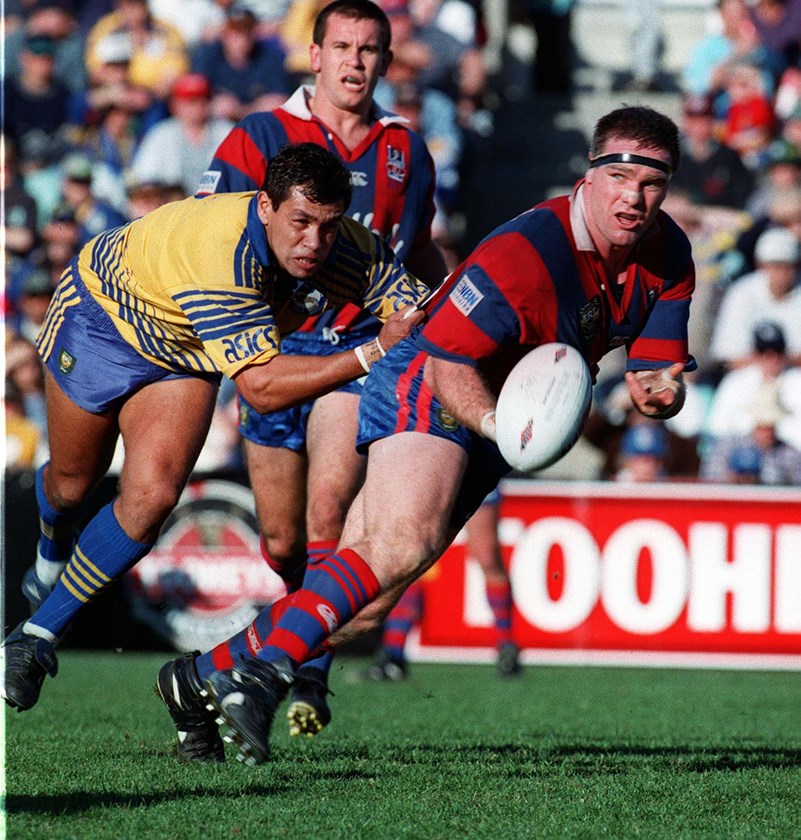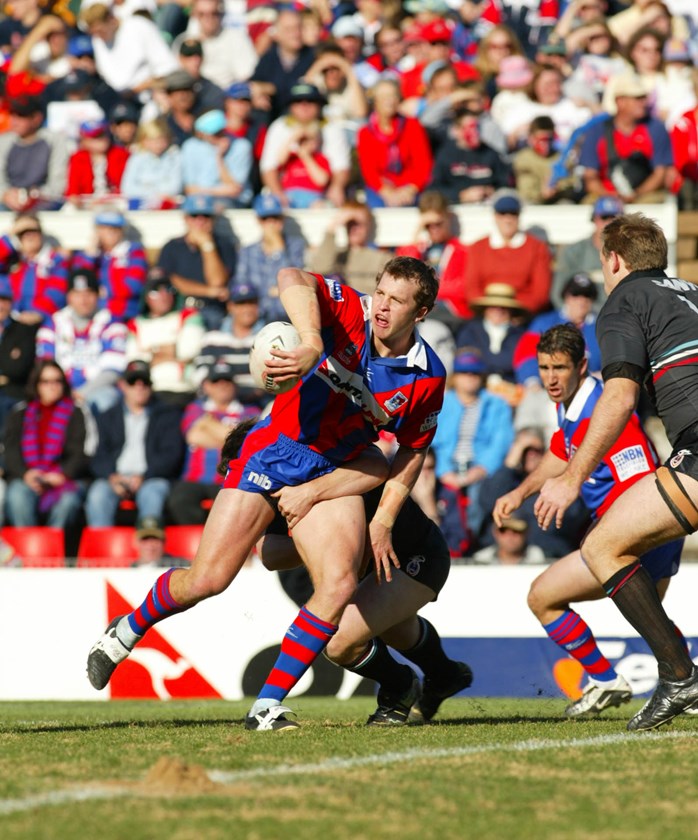"That interest has paid dividends for current players now that someone actually gave a damn."
Clint Newton's rise to the top of the RLPA ranks goes all the way back to the 1980s with his rugby league journey now critical in the talks between players and the NRL's plans to resume the competition in May.
Newton was seven when Knights legend Tony Butterfield arrived in Newcastle after a three-year stint at Penrith in 1988.
His father Jack, a former golfing star who had twice finished runner-up at a major, had retired five years earlier after a freak airplane accident that caused him to lose his right arm and eye.
Butterfield, 22 at the time, bonded with Newton snr over the state of rugby league for players as they entered into a full-time professional environment for the first time in history.
In the background was Clint, who, whether he enjoyed it or not, listened in on nearly every growing development as Butterfield worked to get the Rugby League Players' Association off the ground.
"Clint was a shit-stirring little child, but he'd enjoy listening to me bleed on with Jack and others about how difficult it was to fight for players' rights back then," Butterfield told NRL.com.

"And he took a further interest in that as my career went on and as he started playing rugby league through the grades.
"Looking at things now that interest has paid dividends for current players that someone actually gave a damn."
Newton remembers the earlier days vividly as he finishes another busy day in discussions with the NRL and ARLC Commission in how to get rugby league back safely in a mutual agreement that will cater to players, staff and broadcasters' needs.
With a croaky voice and his youngest daughter Paige by his side wanting some attention, Newton recalled the early foundations of the RLPA being built from the ground up.
"I don't know whether it was Butts's intention but you do become somewhat conditioned when you hear different things repeatedly and the importance of it," Newton said.
"My mother and father were always about helping others and giving back for your contribution whether that be through teammates or the local community.
"That was always a big part of my life growing up. There's a special layer that sits within this journey, I saw the level of effort that Butts put in and sacrifices he made that led to consequences.
"I was able to look through rugby league via a difference lens and I suppose compared to what other players might’ve been exposed to. I had a much more personal connection to it.
My mother and father were always about helping others.
Clint Newton
"Butts and I were very similar in different ways, we weren't naturally talented players and had to work through the ranks.
"But we also understood the varying levels of players and differences with how they're impacted in their careers.
"It gives you a really good perspective and understanding of how a priority for one player in a particular position in the ranks can have a different level for someone else.
"All that needs to be taken into consideration when you're representing an entire group of people dealing with unique and complex circumstances like we are during this time."
For those unfamiliar with Butterfield's involvement with the RLPA – he virtually got things up and running in the late 1990s before he retired as a player in 2000.
In the same year he became president of the newly created association before the sporting body was officially recognised as a national trade union in 2003.
After a successful protest over minimum wage, which led to the cancellation of the Dally M awards in the same year, an agreement was reached with the NRL in a landmark occasion for the game.

"What emerged out of that was the need to recognise that we have moved to being full-time professionals but are we set up?" Butterfield said.
"You had circumstances where for a time people were relatively well paid but where the employers got it wrong was they thought well we've paid you twice as much, you have to train twice as much.
"We since realised with sports science and high performance data that it was folly, but it was how we were thought about at the time ... we were training 4-5 times a day to fill in the time.
"It gave me a good chance from the inside to see what was going on with fellow players and the systems around the rules with contracts.
"Having done my own homework at the time I used to argue with former NRL CEO David Gallop and say most of these guys are not emotionally or physically mature enough to manage this and you've got all the rules and laws that came with the game.
"I remember Garry Hughes before the Bulldogs' Coffs Harbour incident in 2002 said to me 'Tony, with all due respect, we're a footy club, we're not going to spend our money on textbooks. We're going to buy tackling equipment.'

"He was missing the point in that you're now in a professional environment and if you're going to take these guys straight out of school then you've got a greater duty of care now than you ever have."
Newton's involvement with the RLPA didn't begin until 2013 when he was appointed general president before preparing to move back to Newcastle for a second stint at the Knights.
He was influential in the collective bargaining agreement the was created for 2013-2017 and continues to push for the players who aren't as fortunate to sign contracts that will set them up for life.
"My objective was to get it set up, get the first deal and then resign, and I did that," Butterfield said.

"We were trying to set up the base and it was quite comprehensive and took four years to move on a lot of things.
"I'm pleased to see the place has gone from strength to strength and Clint is a big part of that.
"He's a bloke who knows what he's talking about and has seen various trends come and go. He's seen things be left unattended and seen people take advantage of that.
"He's seen how difficult it is for players who were pulled out of school and put straight into a professional environment."
Newton's initiation as RLPA CEO is arguably the biggest test of his professional career both as a player and official.
The former Country Origin and Prime Minister's XIII forward, who also represented the US four times by virtue of being born in California during his father's international golf career, was appointed on March 20, three days before the NRL season was suspended and set to enter the most delicate crisis in rugby league history.
"I think there's a difference between a positive person and an optimist," Newton said.
"I will be much better because of this and already am. That's a positive. A lot of the reporting becomes really critical in this situation.
"A consideration that was mentioned one day is taken off the table 24 hours later.
"Speaking to Andrew Abdo, Peter V'landys and Wayne Pearce, we definitely understand which is why we're working together. We understand there needs to be balance.
"You've got to give people time to work through it because there are a number of sensitivities around it. It's not just players and staff but families and the wider community to factor into all decisions."
Butterfield and Newton were awarded life membership by the RLPA in December.
Newton's recent efforts in stepping up to the plate to replace Ian Prendergast as RLPA boss have not gone unnoticed by the players.

Wests Tigers veteran Chris Lawrence is representative of the sense of responsibility to the cause among the players.
"Given I've been around for 14-15 seasons I feel like I have a responsibility to make sure the playing group is looked after as much as possible and realistically try to reduce the blow for clubs," he said.
"I couldn't have told you players who were involved back when I played. It's probably only been over the last 5-6 years that the players' association has come together and grown in strengths.
"Players have an involvement and are passionate about the collective voice which is good to see."





